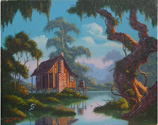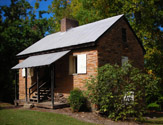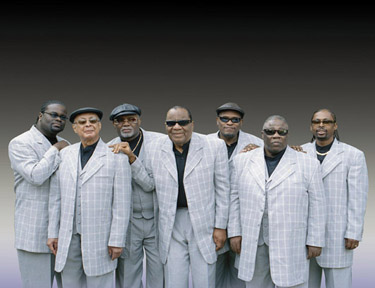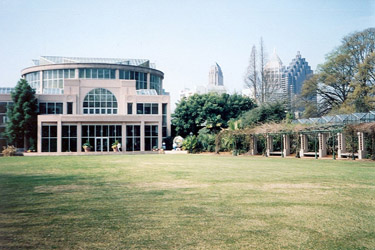















Southern Exposure
The Blind Boys of Alabama
No Retirement in Sight!
No Retirement in Sight!
Ricky McKinnie, road manager, drummer and vocalist for the Blind Boys of Alabama, momentarily interrupts our initial exchange of pleasantries just seconds after answering my scheduled call to his Atlanta home office. "Can you hold on?," he asks. "Sure, no problem," I reply. Then I overhear him respond to the female voice in the background, telling her that he's in the middle of an interview and can't take the other call. She is instructed to intercept his calls for the next fifteen minutes.
"Fifteen minutes?," I say to myself. "I'd better get moving!"
After all, we're talking about a musician and a legendary group who have been performing two to three times longer than many Billboard Top 200 artists have been alive, and that's a lot of ground to cover in just a quarter of an hour, but cover it we do.
Having met in 1939 at the Alabama Institute for the Negro Blind in Talladega, founding members Clarence Fountain, Jimmy Carter and George Scott first performed professionally on October 17, 1944. McKinnie, 53, has known Fountain nearly all his life and first performed with him (as a solo act) and with the group during the 1970s. While their careers have straddled generations, the Blind Boys have really come into their own late in life.
Some might attribute part of their career resurgence to Peter Gabriel and his United Kingdom-based Real World Records or John Chelew's masterful production. Regardless, the Blind Boys have been on a roll, appearing on network television (and inspiring the television drama, Blind Justice), touring Europe and racking up great CD reviews in Rolling Stone, Billboard, USA Today, the Washington Post and even Maxim. McKinnie concurs that Gabriel and Real World "are great people to work with and we have a great producer," but he emphasizes, "God is faithful to the Blind Boys. We are grateful for the opportunity to do what we're doing."
Real World Releases Prompt Mainstream Success, Grammy Awards
Spirit of the Century, the Blind Boys' Real World debut, included traditional gospel fare like "Nobody's Fault But Mine," "Motherless Child" and "The Last Time." And the group threw in a chilling version of "Amazing Grace," performed to the melody of "House of the Rising Sun." Songs by Rolling Stones Mick Jagger and Keith Richards and rocker Tom Waits surprisingly meshed well with the other tracks on this blues-laced, soul-rousing album which garnered the Blind Boys their first Grammy.
A second Grammy winner came on the heels of Spirit of the Century. Higher Ground, recorded with Robert Randolph & The Family Band and guest Ben Harper, included Aretha Franklin's pentecostalesque "Spirit in the Dark," Curtis Mayfield's "People Get Ready," a poignant rendition of the Thomas Dorsey classic, "Precious Lord, Take My Hand" and "I May Not Can See," an upbeat, infectious number McKinnie co-wrote with Damon Little.
"Fifteen minutes?," I say to myself. "I'd better get moving!"
After all, we're talking about a musician and a legendary group who have been performing two to three times longer than many Billboard Top 200 artists have been alive, and that's a lot of ground to cover in just a quarter of an hour, but cover it we do.
Having met in 1939 at the Alabama Institute for the Negro Blind in Talladega, founding members Clarence Fountain, Jimmy Carter and George Scott first performed professionally on October 17, 1944. McKinnie, 53, has known Fountain nearly all his life and first performed with him (as a solo act) and with the group during the 1970s. While their careers have straddled generations, the Blind Boys have really come into their own late in life.
Some might attribute part of their career resurgence to Peter Gabriel and his United Kingdom-based Real World Records or John Chelew's masterful production. Regardless, the Blind Boys have been on a roll, appearing on network television (and inspiring the television drama, Blind Justice), touring Europe and racking up great CD reviews in Rolling Stone, Billboard, USA Today, the Washington Post and even Maxim. McKinnie concurs that Gabriel and Real World "are great people to work with and we have a great producer," but he emphasizes, "God is faithful to the Blind Boys. We are grateful for the opportunity to do what we're doing."
Real World Releases Prompt Mainstream Success, Grammy Awards
Spirit of the Century, the Blind Boys' Real World debut, included traditional gospel fare like "Nobody's Fault But Mine," "Motherless Child" and "The Last Time." And the group threw in a chilling version of "Amazing Grace," performed to the melody of "House of the Rising Sun." Songs by Rolling Stones Mick Jagger and Keith Richards and rocker Tom Waits surprisingly meshed well with the other tracks on this blues-laced, soul-rousing album which garnered the Blind Boys their first Grammy.
A second Grammy winner came on the heels of Spirit of the Century. Higher Ground, recorded with Robert Randolph & The Family Band and guest Ben Harper, included Aretha Franklin's pentecostalesque "Spirit in the Dark," Curtis Mayfield's "People Get Ready," a poignant rendition of the Thomas Dorsey classic, "Precious Lord, Take My Hand" and "I May Not Can See," an upbeat, infectious number McKinnie co-wrote with Damon Little.
There Will Be A Light, a collaboration with music prodigy Ben Harper, and Go Tell It On the Mountain, the Blind Boys' acclaimed, star-studded Christmas project, both fetched two more Grammy awards, but many agree that the 2005 release Atom Bomb might be their best album to date. Highlights include the title track which the group performed on NBC's The Tonight Show with Jay Leno, a smoking version of Norman Greenbaum's once decidedly secular "Spirit in the Sky" and "Presence of the Lord," a track further enhanced by Billy Preston's incomparable organ accompaniment.
Spreading the Word
Spreading the Word

Photograph by Harry Diltz
Unashamed of their faith or gospel leanings, McKinnie acknowledges that the group has been able to successfully take the positive message of its music into the mainstream. He explains this phenomenon by quoting John 12:32 (KJV) which states, "And I, if I be lifted up from the earth, will draw all men unto me."
Regardless of the venue, secular or sacred, McKinnie says the group strives to convey that "no matter your situation, you are somebody and God loves you." We record songs "if the words are powerful and they're gonna touch someone," he says. McKinnie points out that a number of individuals have acknowledged making professions of faith in Jesus Christ as a result of attending Blind Boys of Alabama concerts.
The Blind Boys Lend A Hand
"God's using our disability" for the good by "turning our disability into ability," McKinnie asserts. Indeed, the efforts of the Blind Boys have proven beneficial to organizations like the American Diabetes Association and the American Foundation for the Blind. And when the Nashville-based Gospel Music Association hosted a concert on September 22, 2005 at Atlanta's Centennial Olympic Park to benefit relief organizations assisting Hurricane Katrina victims, the Blind Boys were eager to participate. With scores of Gulf Coast residents struggling to start over from scratch, McKinnie says, "People don't [always] realize that we need one another. That's why we sing 'Give A Man A Home'."
" . . . until God says it's enough"
Ricky McKinnie says the group was saddened by the loss of George Scott whose death a year ago might have marked "an end of an era." "George Scott was a great jubilee singer," McKinnie boasts, admitting that jubilee-style singing is now perhaps esoteric or a lost art. As for Fountain and Carter, McKinnie says, "They sometimes talk about slowing down," but he is convinced that the music is "embedded too deep in their hearts," and the two veterans-now in their 70's-have no plans of going home to sit idle in a rocking chair and sip lemonade for the rest of their lives.
When the group recently received the GMA Music Award for Traditional Gospel Album of the Year, perhaps group member Jimmy Carter summed it up best when he remarked, "We've been together for six decades, but we're still going strong. We're going to continue until God says it's enough."
With fellow band members Bishop Billy Bowers (vocalist who replaced George Scott), Joey Williams (lead guitarist), Caleb Butler (rhythm guitarist), Tracy Pearce (bass guitarist) and, of course, McKinnie, Fountain and Carter continue to sing on both sides of the Atlantic, thrilling audiences of diverse races, ethnicities and ages with their energetic, impassioned performances.
" . . . was blind, but now I see"
Nearing the end of our interview (which incidentally did exceed fifteen minutes!) and sensing the growing list of calls McKinnie must return, I posed two final questions. His answers proved profound and unpredicted. Considering that years from now musicologists and curious gospel fans might reflect on the Blind Boys of Alabama, I asked what he would like for folks to remember most about the group. His response? "We never strayed from what we believed in." On a more personal note, I inquired what he would like for people to remember most about himself. Without a moment's hesitation, he remarked, ". . . that I wasn't blind . . . I just couldn't see."
BIBLIOGRAPHY
Chris Ahrens, "Blind Boys of Alabama---Night Train," Risen, September-October 2004.
Scott Aiges, "Blind Boys and Real World Give Contemporary Voice to Old-Time Gospel," Billboard, April 7, 2001.
OTHER SOURCES
Telephone conversation with Eric "Ricky" McKinnie, Atlanta, on September 8, 2005
Author: Greg Freeman. Published May 7, 2006.
Regardless of the venue, secular or sacred, McKinnie says the group strives to convey that "no matter your situation, you are somebody and God loves you." We record songs "if the words are powerful and they're gonna touch someone," he says. McKinnie points out that a number of individuals have acknowledged making professions of faith in Jesus Christ as a result of attending Blind Boys of Alabama concerts.
The Blind Boys Lend A Hand
"God's using our disability" for the good by "turning our disability into ability," McKinnie asserts. Indeed, the efforts of the Blind Boys have proven beneficial to organizations like the American Diabetes Association and the American Foundation for the Blind. And when the Nashville-based Gospel Music Association hosted a concert on September 22, 2005 at Atlanta's Centennial Olympic Park to benefit relief organizations assisting Hurricane Katrina victims, the Blind Boys were eager to participate. With scores of Gulf Coast residents struggling to start over from scratch, McKinnie says, "People don't [always] realize that we need one another. That's why we sing 'Give A Man A Home'."
" . . . until God says it's enough"
Ricky McKinnie says the group was saddened by the loss of George Scott whose death a year ago might have marked "an end of an era." "George Scott was a great jubilee singer," McKinnie boasts, admitting that jubilee-style singing is now perhaps esoteric or a lost art. As for Fountain and Carter, McKinnie says, "They sometimes talk about slowing down," but he is convinced that the music is "embedded too deep in their hearts," and the two veterans-now in their 70's-have no plans of going home to sit idle in a rocking chair and sip lemonade for the rest of their lives.
When the group recently received the GMA Music Award for Traditional Gospel Album of the Year, perhaps group member Jimmy Carter summed it up best when he remarked, "We've been together for six decades, but we're still going strong. We're going to continue until God says it's enough."
With fellow band members Bishop Billy Bowers (vocalist who replaced George Scott), Joey Williams (lead guitarist), Caleb Butler (rhythm guitarist), Tracy Pearce (bass guitarist) and, of course, McKinnie, Fountain and Carter continue to sing on both sides of the Atlantic, thrilling audiences of diverse races, ethnicities and ages with their energetic, impassioned performances.
" . . . was blind, but now I see"
Nearing the end of our interview (which incidentally did exceed fifteen minutes!) and sensing the growing list of calls McKinnie must return, I posed two final questions. His answers proved profound and unpredicted. Considering that years from now musicologists and curious gospel fans might reflect on the Blind Boys of Alabama, I asked what he would like for folks to remember most about the group. His response? "We never strayed from what we believed in." On a more personal note, I inquired what he would like for people to remember most about himself. Without a moment's hesitation, he remarked, ". . . that I wasn't blind . . . I just couldn't see."
BIBLIOGRAPHY
Chris Ahrens, "Blind Boys of Alabama---Night Train," Risen, September-October 2004.
Scott Aiges, "Blind Boys and Real World Give Contemporary Voice to Old-Time Gospel," Billboard, April 7, 2001.
OTHER SOURCES
Telephone conversation with Eric "Ricky" McKinnie, Atlanta, on September 8, 2005
Author: Greg Freeman. Published May 7, 2006.

The Blind Boys of Alabama will be performing at the Atlanta Botanical Garden on August 9, 2006. Pictured is the garden's Dorothy Chapman Fuqua Conservatory in the shadow of the beautiful Midtown Atlanta skyline. For more concert information, check out the Rosebud Agency.
Copyright
Southern Edition
All Rights Reserved
Southern Edition
All Rights Reserved
All materials contained on this site, including text and images, are protected by copyright laws and may not be reproduced without prior written permission from the publisher. Where applicable, use of some items contained on this site may require permission from other copyright owners.
Fair Use of text from SouthernEdition.com is permitted to the extent allowed by copyright law. Proper citation is requested. Please use this guide when citing a Southern Edition article.
Contact Greg Freeman or SouthernEdition.comFair Use of text from SouthernEdition.com is permitted to the extent allowed by copyright law. Proper citation is requested. Please use this guide when citing a Southern Edition article.